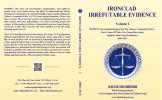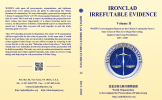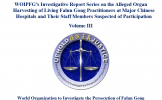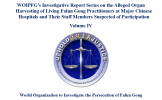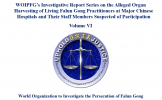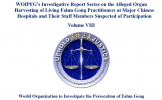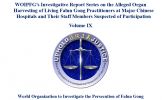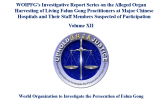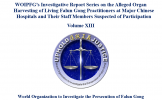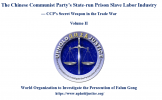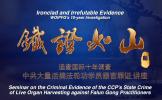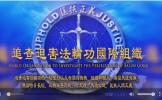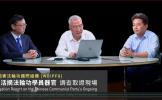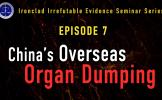Publications from Falun Gong Practitioners: Jiang Zemin's Personal Crusade
Table of Contents
Acknowledgements
Background
Summary
Section I: Who is Jiang Zemin?
Section II: Why Jiang Zemin Launched the Persecution Against Falun Gong
Section III: The "6-10" Office and Jiang's Disregard for Rule of Law in China
Section IV: Jiang Mobilizes China's Security Apparatus
Section V: Falun Gong Issue Permeates Jiang's Foreign Relations Agenda
Conclusion
Appendix A: House Concurrent Resolution 188
Appendix B: FDI– The 25 April Incident (an excerpt)
Appendix C: FDI – Crisis News Bulletin, Aug 20. , 2000
Appendix D: FDI – Crisis News Bulletin, Oct 19. , 2000
Appendix E: Statement Before Congressional-Executive Commission on China
Appendix F: In The News…
CNN: China's Suppression Carries a High Price
CNN: China Wages 'Big-Bucks Diplomacy'
Deutsche Welle: Berlin Tastes Tiananmen
Wall Streel Journal: Death Trap: How One Chinese City Resorted to Atrocities to Control Falun Dafa
Acknowledgements
We wish to thank Amnesty International, the Committee to Protect Journalists, the Wall Street Journal’s Ian Johnson and many others whose work has been instrumental in revealing the true nature of Jiang Zemin’ s dictatorial regime, and the devastating effects it has on Falun Gong practitioners as well as all Chinese people. We also wish to thank the Falun Dafa Information Center volunteers in Washington D.C., New York, Chicago, Seattle, San Francisco, Los Angeles and other cities for their time, diligence and care in assembling this report.
Most of all, we offer our deepest respects to those in China who – in the face of imprisonment, torture and even death – continue to peacefully appeal for the freedoms of speech, assembly and belief in China.
The Information presented in this report was gathered by a team of Falun Dafa Information Center researchers and writers. Some excerpts were taken from reports issued by The Wall Street Journal, The Washington Post, CNN, and The New York Times.
Report Authors:
Mr. Tao Wang, Washington DC Mr. Levi Browde, New York City Mr. Jason Loftus, Toronto, Canada
Report Editors:
Dr. Shiyu Zhou, Philadelphia, PA Mr. Stephen Gregory, Chicago, IL
Background
What is Falun Gong?
FALUN GONG (also called Falun Dafa) is an ancient form of qigong, the practice of refining the body and mind through slow-moving exercises and meditation. Many have come to call qigong, “Chinese Yoga.” Like yoga and tai chi, qigong is a vital part of many people’ s lives in Asia; almost every Chinese park is brimming by the break of dawn with people practicing these arts.
Yet Falun Dafa is different from most other qigong practices in that it goes beyond the pursuit of health and fitness to the goal of wisdom and returning to one’ s original, altruistic nature. At the heart of the practice are three principles: Truthfulness, Compassion, and Forbearance. Through a combination of studying the books of Falun Dafa and performing the exercises, practitioners strive to become better people by embodying these principles in everything they do.
The Evolution of Falun Dafa
Falun Dafa was introduced to the public in May of 1992, when Mr. Li Hongzhi gave his first lecture in Changchun City, China. Soon afterwards he traveled with several students to the Oriental Health Expo in Beijing where Falun Dafa earned several awards, prompting organizers to invite Mr. Li to give several impromptu lectures on the principles of Falun Dafa.
During the following two and a half years, Mr. Li lectured on invitation in almost every major Chinese city, giving fifty-four lecture series in all. All instruction at that time was overseen by the Chinese government’ s top qigong organization, the China Qigong Scientific Research Society.
Although Mr. Li gave his last lecture series at the end of 1994, the practice continued to grow from 1995 to 1999 at an explosive rate. During those years, the practice was passed on by word of mouth and free of charge, and volunteers organized practice sites.
Since 1995, Mr. Li Hongzhi has traveled to countries around the world to lecture on Falun Dafa and discuss the practice with students. All lectures have been free and open to the general public. By the middle of 1999, Falun Dafa was practiced in over 40 countries around the world1.
The Persecution of Falun Dafa in China
Many Chinese leaders, including Chinese Premier Zhu Rongji and the Director of China's Sports Commission, Mr. Wu Shaozu, applauded the health benefits the practice brought to the nation.2 Communist Party head, Jiang Zemin, however, grew fearful of such a large number of people and – believing that the peaceful nature of Falun Gong made for an easy target – banned the practice in 1999. Failing to “eradicate Falun Gong in three months3,” as Jiang had proclaimed, Jiang has intensified the propaganda campaign to turn public opinion against the practice while quietly imprisoning, torturing and even murdering those who practice it.
1 According to a count of the number of countries listing volunteer Falun Dafa practice sites on the main website of Falun Dafa, www.falundafa.org as of August, 1999.
2 U.S. News & World Report report “ An opiate of the masses?” ; February 22, 1999 3 See Appendix C
China experts point to the systematic campaign Jiang has carried out against Falun Gong, saying it also demonstrates an ulterior motive: In a Feb. 9, 2001 article, CNN’s Senior China Analyst, Willy Wo-Lap Lam, quotes a senior Chinese Party member as saying, "By unleashing a Mao-style movement [against Falun Gong], Jiang is forcing senior cadres to pledge allegiance to his line...This will boost Jiang’s authority:" By painting Falun Gong as an enemy of the state, Jiang hopes to mobilize the nation into a struggle with himself at the helm, and thereby consolidate power.
As of October 14, 2002, the Falun Dafa Information Center has verified details of 493 deaths4 since the persecution of Falun Gong in China began in 1999. In October 2001, government sources inside China, reported that the actual death toll was well over 1,600. On October 14, 2001, the confirmed death toll was
323. If the actual death toll shows the same increase as the confirmed death toll has, then we would expect the true death toll today to be well over 2,500. Due to extreme difficulty in discovering and verifying information in China related to wrongful deaths, this higher figure also likely understates the true death toll. For instance, in March of this year police from several provinces poured into the city of Changchun and placed a several weeks long siege on the city. Residents reported dozens, if not over one hundred, practitioners were killed. In this chaos, little detailed information about these deaths could be gathered by the Falun Dafa Information Center
“Intensifying the Campaign Overseas”
Soon after Jiang Zemin began persecuting Falun Gong in China, the international community reacted,
condemning Jiang’ s actions. On November 18, 1999, the United States Congress passed joint resolutions (House and Senate), condemning the persecution. The Wall Street Journal’ s Ian Johnson began authoring a series of articles exposing the atrocities committed against people who practice Falun Gong in China that would later win him the Pulitzer Prize for International Reporting. U.S. governors, mayors and state legislators began issuing proclamations of support and encouragement to people who practice and/or support Falun Gong throughout the U.S.
This response by the international community put pressure on Jiang to end his anti-Falun Gong campaign. Jiang, however, responded by issuing a directive: “ intensifying the campaign overseas.” 5 Thus, Chinese Embassies and Consulates around the world began escalating efforts outside China to stamp out support for Falun Gong, to disrupt Falun Gong activities, and to try to get them banned.
For the past three years, Chinese Embassy and Consulate officials have worked to slander and persecute Falun Gong here in the United States, and in other countries around the world.
Jiang wishes to nullify any criticism of his handling of Falun Gong. He also wishes to maintain absolute control over what Chinese citizens hear and see about Falun Gong. Most mainland Chinese only know what the state-run media report. Nevertheless, the more positive support Falun Gong receives overseas, the more difficult it becomes to hide this support from the people of China.
4 See www.faluninfo.net for current statistics 5 See Appendix D
Summary
“Jiang has mobilized a Mao-era mass movement against [Falun Gong…] Yet, the most severe criticism leveled at Jiang’s handling of the Falun Gong is that he seems to be using the mass movement to promote allegiance to himself.”
– Excerpt from a July, 2000 article by CNN’ s Senior China Analyst, Willy Wo-Lap Lam
Section 1: Who is Jiang Zemin?
Jiang Zemin came to power in the wake of the Tiananmen Square Massacre. Hard-liners within the Communist Party had been impressed with his willingness to toe the Partly line, and so appointed him to the nation’ s top post on June 24, 1989.
During Jiang’ s leadership, he implemented a wide-scale system of giving lavish economic benefits to would-be supporters in order to consolidate a power base in the Party. As Jiang continued extending wealth and benefits to his circle of influence, however, many of the nation’ s problems were left unattended.
Section II: Why Jiang Persecutes Falun Gong?
Jiang believed that the explosive spread of Falun Gong throughout the country in the later half of the 1990’ s posed both a threat and an opportunity. Falun Gong was a threat, he felt, because there were so many people practicing, and because Falun Gong was rooted in traditional Chinese culture and values – something the Communist Party had spent years trying to eradicate from the country.
Yet, for Jiang, Falun Gong also posed an opportunity.
With the endemic problems of corruption, unemployment and poverty, the pressure on Jiang was increasing. Thus, to consume the nation in a political campaign against a “ public enemy” would not only divert attention away from Jiang, but also provide the circumstances necessary to force rivals within the Party to toe his line, thereby consolidating his power within the Party.
Thus, on the evening of July 20, 1999, Jiang unleashed a nationwide persecution campaign against the peaceful practice, and has, since that time, continually escalated the campaign both in severity and scope.
A Nation’s Security Apparatus in Turmoil
To implement the persecution, on June 10, 1999, Jiang established a “ 6-10 Office” – an illegal, above-thelaw entity reporting directly to the Politburo, and with jurisdiction over the entire country.
Utilizing a top-down, by-any-means-necessary approach, Jiang has whipped the nation’ s security apparatus into a frenzied system of bribery, extortion and systematic torture. Those who carry out the persecution of Falun Gong practitioners are, themselves, victims who are often forced into a choice between their moral conscience and their job, their sense of duty to the people and their livelihood. It is a system that has transformed regular Chinese cities and towns into “ death traps,” where “ local police regularly torture residents to death,” as reported in the Pulitzer-Prize winning series of articles by the Wall Street Journal’s Ian Johnson.
The Cover Up
Contrary to Jiang’ s perception that the peaceful nature of Falun Gong made for an easy target, Falun Gong has responded with unwavering peaceful appeal, determined to retain the rights to freedom of speech, assembly and belief enshrined in China’ s own constitution. Thus, Jiang’ s campaign to “ crush Falun Gong in three months” has failed, and the campaign – now in its fourth year – brings an ever-increasing stream of criticism from the international community. Requiring the leverage of good international relations to build up a power base at home, Jiang has gone to great lengths to stifle this criticism, thrusting the Falun Gong issue to the forefront of his agenda when dealing with other nations.
Indeed, coercing other nations to ignore his handling of Falun Gong in China, while at the same time stifling support for the practice overseas, has become a focal point for every trip Jiang has made overseas since 1999.
Section I: Who is Jiang Zemin?
As head of the Chinese Communist Party, Chinese Army, and the Chinese Government in a nation of more than 1.3 billion people, Jiang Zemin is perhaps one of the world’ s most powerful leaders. However, most know very little about Jiang, his rise to power and his policies as chief of the Communist regime in China.
Jiang can be said to be the biggest beneficiary of the June 4th student massacre in Tiananmen Square. Following the massacre, Secretary General Zhao Ziyang was ousted and Jiang was appointed to the top position.
From Technical Staff all the way to Mayor of Shanghai
During the first four decades after the Chinese Communist Party came to power, Jiang Zemin had risen steadily from his beginning as a lowly technical staff member. Acquaintances of Jiang in his early days comment that he did not possess a driving philosophy or ideology, as had his predecessors Mao Zedong and Deng Xiaoping. Instead, Jiang had an instinct for deftly landing on the advantageous side of the tumultuous political campaigns that swept through the Communist Party over several decades.
During the Cultural Revolution in China, most officials who held “ traditional” values were demoted or stripped of their posts. Jiang managed to escape unscathed. By the 1980’ s, Jiang was Mayor of Shanghai, China’ s largest City.
Jiang Zemin and the Student Massacre of 1989
In 1989, after a decade of economic reform and opening up, many in China had begun to appreciate western ideals of freedom and democracy. A Shanghai newspaper, World Economic Daily, became highly popular for its willingness to publish content considered too controversial for most of the state-run press. In the spring of 1989, Jiang publicly expressed his support of the paper and told the editor, Qin Benli, that the Shanghai municipal committee would work to reduce pressure on the World Economic Daily.
One month later, the World Economic Daily held a memorial service for a deceased party member who had sought political reform. The gathering drew a lot of students. Chinese leaders such as Deng Xiaoping, although not opposed to the idea of economic reform, still believed in the absolute power of the Party. On April 26, therefore, the front-page headline in the state-run People’s Daily labeled the large student presence a “ riot.”
Jiang acted quickly.
Almost immediately, he convened a meeting with thousands of government officials. He announced that Qin Benli would be stripped of his post and the World Economic Daily shut down. The decision drew large protests but impressed Communist Party hard-liners in Beijing. Less then two weeks later, hundreds of students were massacred in Tiananmen Square. Zhao Ziyang, who seemed sympathetic to the students, was ousted from his post as Secretary General and Jiang was thrust into his place.
Jiang Consolidates Power: Promotions, Bribes, and Corruption
Although Jiang Zemin assumed the post of Secretary General in the wake of the Tiananmen Square Massacre in 1989, former Chinese leader Deng Xiaoping, who had appointed Jiang, continued to hold the reins of power. When Deng Xiaoping passed away in 1997, however, Jiang Zemin found himself not only the head of the Chinese Communist Party, but President as well; he was at the absolute top of the political ladder. But Unlike Mao Zedong, who founded the People’ s Republic of China, or Deng Xiaoping, who led China to prosperity and strength, Jiang Zemin was widely regarded as someone who had accomplished little as the nation’ s leader. Jiang knew his position was far from secure and immediately took action to consolidate his power.
The Chinese people, after enduring 30 years of poverty and isolation from the world under Mao, and then having enjoyed a taste of economic reform and improved living standards under Deng, were terrified of being poor again. Jiang Zemin took advantage of this fear.
If Jiang could not gain the respect of the Party elite, he could refashion the elite, making it dependent on him for wealth and privilege. On October 24, 1997, six months after Deng died, Jiang Zemin appointed 152 new generals. In the previous 10 years, Deng Xiaoping had only appointed 16 new generals. Jiang also allowed certain favored groups of people such as veterans of the Party, army, local government officials, intellectuals, and some businessmen to gain great material benefits through their connections with the state. This deliberate indulgence of corruption caused chaos in the social and economic systems by seriously eroding the morality of the ruling class.
Editorials in the state-run media raised Jiang’ s campaign of self-promotion to a national virtue, “ We should always rally around Chairman Jiang, and adopt his views.” The recent campaign that urges the Chinese people to “ learn Jiang’ s Three Represent’ s deeply and apply them everywhere” is simply another version of this same theme.
Those not eager to adopt the view that Jiang’ s welfare should be the principle of China’ s politics have faced consequences. Hong Kong’ s Zheng Ming magazine reported that 157 veteran generals were forced into early retirement in 2001 because they were not enthusiastic about Jiang’ s self-promotion campaign. 50 of these generals were forced to leave the army entirely.
Section II: Why Jiang Zemin Launched the Persecution Against Falun Gong
“Originally, many China watchers believed the number of people practicing Falun Gong – 70-100 million by the Chinese government’s own estimate in 1998 – was viewed as a threat by Communist Party leader, Jiang Zemin. Over the last three years, however, much information has been brought to light suggesting that Jiang’s obsession with “eradicating” Falun Gong is more deeply rooted in the personal fears and ambitions of Jiang himself. For Jiang, it is a personal crusade, and one upon which he has banked his entire political career.”
--Dr. Yingnian Wu, UCLA
70-100 Million People – A Growing Concern?
Having significant health benefits and being something rooted in traditional Chinese culture, the practice of Falun Dafa flourished in China after its public introduction in 1992. Between 1995 – 1999, the practice grew at an explosive rate. A 1998 survey by the Chinese government determined that 70 million people were practicing Falun Dafa.6
In China’ s tightly controlled Communist society, no groups have been allowed to be independent of government authorization and oversight, let alone such a huge group. Many China watchers believe the size alone of Falun Gong put Chinese officials on guard. But the government did not reflexively try to smash Falun Gong. It twice investigated Falun Gong thoroughly. According to sources familiar with the investigation, included in the findings from the second investigation was the conclusion that Falun Gong is beneficial to health, benign in nature and non-threatening to the government. Thus, while the explosive growth of Falun Gong throughout the country clearly made some officials concerned, this factor alone did not act as a catalyst for the persecution that began in July 1999.
Jiang’s Circle of Corruption Breeds Growing Troubles in China
In 1998, some Chinese officials estimated that 10% of the Gross National product was embezzled by corrupt government officials. Premier Zhu Rongji is reported to have once said in a government meeting,
“ Every year, 80% of the military-owned enterprises’ capital and income are embezzled by the senior and mid-level military cadres.”
While the social and economic wealth of the country was bestowed upon a privileged few, the common people suffered tremendous loss. According to the book China by the Yellow River, within the first five years of Jiang Zemin’ s rule, China developed the highest unemployment rate, the largest scale of ecological damage, and the widest gap between the rich and poor in the world. Robbery rates are the highest in the world. The violent murder rate in Chinese cities is ranked No. 5. The rate of drug smuggling cases is No. 3, and illegal gambling is No. 1.
Thus, with corruption and domestic problems in China exploding, many began placing the blame on Jiang Zemin.
Jiang Views Falun Gong as a Threat from Two Angles
With a 5,000-year history, the Chinese civilization and culture is arguably the oldest in the world.
6 The New York Times “ Notoriety Now for Exiled Leader of Chinese Movement” ; April 27, 1999
Since the Communist Party came to power in 1949, political movements aimed at eradicating traditional culture have devastated the country. These political campaigns attempt to cut all ties with the traditions and culture of China, so as to leave only the Communist ideology in the hearts and minds of the people. Chairman Mao’ s disastrous Great Cultural Revolution in the late 1960’ s and early 1970’ s was the most extreme expression of this tendency. Traditional temples and monasteries were destroyed. Great teachers of the past, such as Confucius and Lao Tzu were condemned and ridiculed. Scholars and historians were persecuted.
Throughout China’ s history, the art of ‘qigong,’ sometimes referred to as Chinese Yoga, has been a centerpiece of Chinese culture. As an advanced form of ‘qigong,’ Falun Gong grows out of this rich tradition, bearing the wisdom and spirit of traditional Chinese culture. Thus, with the rise in popularity of
Falun Gong in the early 1990’ s, China was not just witnessing the growth of a qigong practice, but a resurgence of traditional Chinese culture.
Unlike the great majority of the qigong practices that emerged in the early 1970s, Falun Gong goes beyond the pursuit of physical health and fitness to the goal of wisdom and returning to one’ s original, altruistic nature. At the heart of the practice are three principles: Truthfulness, Compassion, and Forbearance. To practice Falun Gong does not simply mean to perform the exercises and do the meditation. It involves truly taking the principles to heart, striving to improve oneself by embodying these principles in everything one does.
As the practice flourished throughout the country, the people of China could see how people who practice Falun Gong handled difficulty and conflict with balance and calm, looking out for the welfare of others in all situations.
In the principles of Falun Gong and the degree to which people stood by them Jiang saw a threat to his manner of rule. He could see that those who practice Falun Gong represented a group of people virtually untouchable by his methods of bribery, corruption, and lavish benefits.
Still, Jiang also saw in the Party’ s long-standing opposition to traditional Chinese culture something he could utilize for political gain.
April 25th, 1999 – The “Zhongnanhai Incident”
As a highly visible event and one that was unprecedented in post-Tiananmen Square Massacre Beijing,
the gathering of 20,000 practitioners of Falun Gong around the central government compound in China’ s capital on April 25, 1999 was viewed by many as the key turning point in Jiang’ s stance on Falun Gong.
The “ Zhongnanhai Incident” proved to be the catalyst for the escalation of the persecution of Falun Gong into a systematic, highly public, nation-wide effort. By January 1996 the book Zhuan Falun – the main text of Falun Gong – was top of the best-seller lists, and the meteoric rise in popularity of Falun Gong brought the practice to the attention of the Public Security Bureau.
Under the leadership of Luo Gan the Bureau tried to put a brake on the expansion of Falun Gong by disseminating adverse publicity. Concerted investigations in 1997 and 1998 failed to turn up any incriminating evidence, but the heat was gradually turned up in 1999 when a politically active physicist named He Zuoxiu, who theorizes that “ Marxism is also science” 7 and who had gained notoriety in 1998 by attacking Falun Gong publicly, authored an inflammatory article against the peaceful practice. The article lead to appeals and arrests in Tianjin. The Falun Gong practitioners were subsequently told by the authorities in Tianjin to take their appeal to Beijing. Phone calls were made, Emails sent and the next day 20,000 people (according to official estimates) showed up.
7 “ China's Rulers on Guard…” The New York Times; May 3, 1999
Jiang maintained that the incident was: “ …carefully plotted, closely organized, and a premeditated, serious political incident.” 8 He flatly refused to believe that the gathering was a purely spontaneous affair with honorable motives. Most of all, he perceived a political opportunity whereby he could shore up his own personal power.
Conclusion – Jiang Takes Aim at Falun Gong, Hoping to “Kill Two Birds with One Stone”
In July 1999, with the excuse of the Zhongnanhai Incident, Jiang took aim at Falun Gong, unleashing a
“ Mao-era mass movement” against the spiritual practice.9
In seeking to “ eradicate Falun Gong,” Jiang hoped to erase a perceived threat, and in doing so to divert the people’ s anger over the state of the nation away from himself. He hoped to build up Falun Gong as a “ public enemy” and a “ menace to society.” Then, by mobilizing a political campaign with himself at the helm, Jiang could present himself as the nation’ s “ defender.” If the people rallied behind Jiang, even Jiang’ s rivals in the Party would be forced to step in line behind him.
Thus, Jiang sought to kill two birds with one stone – he would eradicate a group he perceived to be a threat, and in doing so consolidate his political power.
8 “ Zhu Rongji in 1999 (I)” by Zong Hairen, Guest Editor: Andrew J. Nathan, Columbia University 9 See Appendix F: CNN, “ China’ s Suppression Carries a High Price”
Section III: The “ 6-10” Office and Jiang’ s Disregard for Rule of Law in China
"[The persecution of Falun Gong] violates the Constitution of the People’s Republic of China [...] Jiang Zemin’s regime has created notorious government ’610’ offices throughout the People’s Republic of China with the special task of overseeing the persecution of Falun Gong members through organized brainwashing, torture, and murder [...] Official measures have been taken to conceal all atrocities, such as the immediate cremation of victims, the blocking of autopsies, and the false labeling of deaths as from suicide or natural causes"
– U.S. House Resolution No. 188 passed unanimously by a 420-0 vote on July 24, 2002
Jiang’ s persecution of Falun Gong has not only taken place outside of China’ s law, it has given birth to an extra-constitutional, extra-judicial office that has no meaningful restraint beyond Jiang’ s will – the “ 6-10 Office.”
The term "6-10 Office" is an alias for the "Supervising team in charge of the dealing with Falun Gong." It is described by human rights advocates as the central control structure for the state terror employed against Falun Gong practitioners in China today.
On June 7, 1999, Jiang Zemin gave a speech at a Politburo meeting, where he fully laid out his policy of oppression against Falun Gong calling for the “ Handling and Resolving of the 'Falun Gong'Issue Without Delay." He ordered his subordinates to establish a "leadership group that will specialize in handling the 'Falun Gong'issue," On June 10, 1999, under Jiang's direct orders, the Chinese Party Central Committee officially set up an office for the "leadership group" and named it the "6-10 Office."
In this meeting Jiang further specified that "the Central Committee and government units in all ministries and commissions, and all provinces, autonomous regions, and municipalities directly under the Central Government need to act in close coordination" with the ‘6-10 Office.’ " The "6-10" became a well-organized and independent system reaching from the Central Government to the local governments, having power over each level of administration in the Party, as well as over the political and judiciary branches. It is the highest authority deployed by Jiang Zemin and his accomplices to specifically persecute Falun Gong.
The “ 6-10” office is the embodiment of arbitrary power. It has been employed by Jiang on the basis of a legal foundation no less arbitrary. In July 1999 Jiang Zemin, through the Bureau of Civil Affairs (an Administrative branch), declared Falun Gong to be an illegal organization. According to Articles 2, 80, and 81 of the Constitution of the People’ s Republic of China, only the National People’ s Congress has the ability to declare an organization illegal. The President does not possess such power. Yet, this executive order initiated the widespread crackdown against Falun Gong.
In October 1999, the National People’ s Congress passed a series of laws targeting “ evil cults.” Regarding these laws, a November 2, 1999, article from the Washington Post stated: “ When [China’ s Communist leaders] found themselves without the laws they need to rigorously persecute a peaceful meditation society, the Party simply ordered up some new laws. Now these will be applied – retroactively.” These laws were dictated by Jiang Zemin, using the National People’ s Congress merely as a rubber stamp. Doing so oversteps the authority granted to the President by the Chinese constitution. Applying these laws retroactively to prosecute Falun Gong practitioners and sentence them to prison terms was also an illegal action.
In the past three years, the "6-10 Office" has orchestrated the persecution of Falun Gong and its practitioners. It has coerced every Political and Judiciary branch and all levels of government into implementing secret orders issued by Jiang Zemin--"Discredit Falun Gong. Cut off any financial resources to Falun Gong. Physically destroy Falun Gong practitioners."
Labor camps, detention centers under the local civil administration and the public security bureau, administrative lockup houses, drug rehabilitation centers, and prostitute reeducation facilities have all become tools for the “ 6-10” to illegally detain and torture and kill Falun Gong practitioners.
The "610 Office" is responsible for hundreds of thousands of cases of defamation, extortion, expulsion (from school and jobs), beatings, torture (medieval and modern), rape, mutilation, sodomy, forced abortions, electrocution, arbitrary detention, false imprisonment, torture, sexual and psychiatric abuse, disappearance, and murder.
As of October 22, 2002, more than 500 practitioners have been illegally sentenced to prison terms. Thousands have been sent to mental hospitals. Hundreds of thousands have been forcefully arrested, detained or sent to labor camps without any legal proceedings. The practitioners are forcefully separated from their spouses and children, and their friends and relatives are also punished.
Section IV: Jiang Mobilizes China’ s Security Apparatus
“ Under intense pressure to stem the flow of protesters heading to Beijing, Weifang officials stationed police in Beijing, ran their own prison there and sent detainees to ‘transformation centers’ back home where they were beaten until they renounced their faith, or died. The ferocity of police in these centers only increased after higher-level officials started fining their subordinates.”
– The Wall Street Journal, December 26, 2000
His name cannot be disclosed as it would bring him certain imprisonment and torture at the hands of his fellow policemen, nor his rank and badge number verified, but his story – corroborated by an article written by The Wall Street Journal’ s Pulitzer Prize winning journalist Ian Johnson in December, 2000 – reveals a shocking system of bribery and extortion at work among the police officers and security personnel in Beijing that offers financial incentives to torture Falun Gong practitioners detained in the capitol city.
Since 1999, leading human rights agencies have reported the systematic torture and killing of Falun Gong practitioners in virtually every region of China. What is less understood, however, is how Jiang Zemin has been able to enlist on a wide-scale the police and security forces throughout the country in such an endeavor.
Pressure “From Above” Gives Free Reign to Prevent Falun Gong Appeals
In order to implement the persecution from the top down, Jiang and his supporters have used pressure to recruit the support of policemen and officials at every level. As a result, many officers comply to avoid being persecuted themselves, which could take the form of being fired from their jobs, harassed or even thrown into labor camps.
Since Jiang Zemin made the persecution of Falun Gong practitioners a top priority in 1999, the Central Government has held every region directly responsible for stifling public appeals for Falun Gong from their respective provinces. According to Officer Zhao, if a specified threshold is surpassed, the local officials will be criticized by their superiors and forced to write "self-criticism" statements, and often face financial penalties or other punishments.
Local officials, in turn, implement the same method to further shift the responsibility down to the cities and towns, and finally to the police stations, police chiefs and policemen who administer the torture. According to Officer Zhao, this system of local suppression, known as the "first hand project," is usually headed by the chair of the Political and Legal Committee in each locality.
In his article from December 12, 2000, Ian Johnson of The Wall Street Journal states that this system "puts huge pressure on local officials to comply with central edicts -but gives them absolute discretion over implementation," which often means brutal torture. Johnson reported that in Weifang, like many other cities, this policy led to "tragic decisions," and that the cruelty of the police "only increased after higher-level officials started fining their subordinates for each protester who arrived in the capital."
Officials Resort to Bribery to Avoid Punishment “From Above”
When a practitioner is indeed arrested in Beijing, the first task that faces the Beijing police is discerning which region that person is from. The policemen then need to report to the "610 Office" how many practitioners have been arrested from each region.
"In order to have the practitioners’ appeals not be recorded so as to not tarnish the image of the local people in charge of suppressing Falun Gong," Officer Zhao reveals, "the Tiananmen police station [personnel] who persecute Falun Gong practitioners, from the patrolling police to the department chief, are the target of bribing by the regional or local governments. The prices for obtaining the record of one practitioner range from 200 to 500 RMB or even higher."
According to Officer Zhao, perhaps as few as one in ten practitioners arrested at Tiananmen Square is reported. This reason may account for some of the numerous cases of missing people, as well as for the discrepancy between the accounts of Tiananmen vendors, who testify that appeals for Falun Gong take place everyday, and those of the policemen, who claim they hardly occur.
According to the policeman, the Tiananmen police station is not the only office receiving such a bonus. Various departments in Beijing that compile name based lists of Falun Gong practitioners-such as the Public Security Bureau, National Security Bureau, Railway Branch Bureau, Appeals offices, different detention centers, and the "610 Office" itself -are taking part in the subornment as well.
Torture for Profit
Indeed, persecuting Falun Gong practitioners has become a profitable enterprise for many departments. In order to receive these bribes officers must quickly obtain the addresses of those who appeal in Beijing. To get them to disclose this information, the policemen will either trick or beat the practitioners. If neither of these methods works, they send the practitioners to other stations and detention centers for further torture in order to obtain the information.
The opportunity to receive bribes along combined with the threat of punishment from their supervisors if they cannot successfully obtain the practitioners’ addresses has resulted in the application of systematic, ruthless torture. Simply put, some policemen stop at no means to obtain the desired information, not because they agree with the government’s policy but in order to make a few Yuan.
Officer Zhao concludes: “ Thus the persecution of Falun Gong practitioners has become an effective way for related departments in Beijing to make money. That’ s why they try best to find out a practitioner’ s identity. A police in Fuyou Police Station disclosed that their office equipment and air conditioners are obtained from a province’ s bribery.”
Losing Support
However, as more policemen have become familiar with Falun Gong, many are growing reluctant to go along with the persecution's corruption. Scott Chinn from New York testifies that while detained in Beijing after appealing for Falun Gong, a policeman showed him a message he had typed on his cell phone; it read: "I know Falun Gong is good. I am terribly sorry." A practitioner from Toronto, who often calls Chinese police stations, shares a conversation she had with the chief director of a police department: "At the end of our discussion he told me sincerely that he would no longer torture Falun Gong practitioners".
Indeed, many policemen, such as the one who provided the information about the "torture for profit" system, have decided they do not wish to persecute Falun Gong practitioners. Jiang's persecution has thus put these policemen and officials in a position in which they have to choose between profit and freedom from punishment on the one hand, or living according to their moral principles on the other. As such, they too are victims of this persecution.
Section V: Falun Gong Issue Permeates Jiang’ s Foreign Relations Agenda
“ Ever since Jiang Zemin came to power during the Tiananmen Square Massacre, the focal point for China’ s foreign relations –including, to some extent, economic/trade relations with the west –has been human rights. Since the Falun Gong persecution started in July 1999, Falun Gong has become the most prominent human rights issue in China. Thus, Jiang’ s efforts to downplay criticism for his handling of Falun Gong and stifle support for the practice in other countries looms large on his foreign relations agenda. In fact, it is the focal point on many fronts.”
– Dr. Shiyu Zhou, Professor at Rutgers University
John Kamm is a former President of Hong Kong's American Chamber of Commerce. In 1991, Kamm left the business world and founded Dui Hua, or “ dialogue,” a non-profit organization based in San Francisco that works for the release of unlawfully jailed prisoners in China. According to the New York Times, “No other person or organization in the world, including the [U.S.] State Department, has helped more Chinese prisoners.” 10
During a talk with NYU law students in the fall of 2000 regarding his unprecedented success in negotiating the freedom of prisoners with Chinese officials, Kamm revealed three things the Chinese regime wants more than anything:
| 1) | Entry into the WTO |
| 2) | To host the 2008 Olympics |
| 3) | To stop being censured for its Human Rights record, in particular by the U.S. and UN |
China has won the bid for the 2008 Olympics and has gained entrance into the WTO. Stopping censure of human rights violations, however, remains an elusive goal. The human rights record in China has dramatically worsened in recent years.11
For Jiang Zemin, stifling criticism of China’ s human rights record remains a top priority in relations and negotiations with the international community. Indeed, it is the focal point for Jiang’ s foreign relations, and for the past three years, Falun Gong has been the most prominent human rights issue in China. To understand Jiang’ s deals and maneuvers on the international stage, one must first understand the shadow Jiang’ s handling of Falun Gong extends over the negotiating table with other nations.
Consolidating Power at Home by Polishing Image Abroad
At the 16th Party Congress later this year, Jiang Zemin is slated to step down from his post as Party boss, handing the reigns to China’ s “ fourth generation” of leaders.
Much like Deng Xiaoping before him, however, Jiang has made no secret about his aspiration to maintain hold on the reins of power from behind the scenes after he officially steps down. To do so, he will need a consolidated base of political power in China.
Under Jiang’ s leadership, however, human rights have dramatically worsened. On May 30, 2001, Amnesty International listed Jiang Zemin as one of five human rights “ scoundrels.” Also in 2001, the Committee to Protect Journalists named Jiang one of the top ten “ enemies of the press” for the fifth year
10 “ John Kamm’ s Third Way,” The New York Times; March 3, 2002 11 Amnesty International 2001 Annual Report
in a row. To bolster an image abroad, Jiang has resorted to the same methods and tactics he used to build his power-base domestically – inundate would-be supporters with financial rewards, while employing dictatorial means to suffocate voices of dissent. Jiang has extended financial and political favors to countries willing to accept rewards that come with strings attached.
The fundamental reason why the world media and governments have not been more outspoken about the greatest human rights crisis in China since Tiananmen Square is Jiang Zemin utilizes all financial assets at his disposal to keep the Falun Gong issue – and the human rights issue more broadly – under lock and key.
Just how important is the Falun Gong issue to Jiang’ s foreign relations agenda? Here are a few illustrations.
Former President Bill Clinton
At an hour-long summit with then U.S. President Bill Clinton during APEC’ s 1999 meeting in New Zealand, Jiang Zemin made clear his concern that the U.S. show the “ correct” attitude on the Falun Gong issue. Among the range of important issues discussed, only the Falun Gong issue was both raised directly by Jiang Zemin as well as documented in a book that Jiang gave to the President. The Associated Press reported: “ As China and the United States sought to mend recently damaged ties, President Jiang Zemin gave President Clinton an unusual gift: a book defending China's ban on a popular meditation sect [Falun Gong]. During their hour-long summit Saturday, Jiang handed Clinton a book purporting to expose the crimes committed by Li Hongzhi, founder of Falun Gong …the book's 150 pages in English is a relentless barrage of propaganda from China's entirely state-run media.”
The report pointed out that “ Far from an academic exercise, Jiang's gift seemed intended to head off a new human rights dispute.” 12
Germany
Chinese Communist Party head, Jiang Zemin, visited Germany in early April 2002. Included among the demonstrators during his visit were practitioners of Falun Gong, whose presence was described by the German news service Deutsche Welle: “ Some 400 Falun Gong followers, all with apparently peaceful intentions, came to Berlin and staged silent protests at locations visited by Jiang…Most sat cross-legged on the pavement, meditating, and others walked with placards opposing Beijing’ s policies.” 13
Despite the peaceful nature of Falun Gong’ s presence, however, on the second day of his visit, Jiang made a bizarre series of requests, threatening to leave Germany if the requests were not made, leaving an important contact between automakers in their two countries unsigned as well as other important business unfinished. Jiang’ s requests included:
1) Hotel Evictions: All Asians staying at Jiang’ s hotel – the Aldon – during his visit were forcibly
evicted from the hotel, including citizens of the U.S., Germany, Canada, and other countries.
Asian hotel employees were also told not to report to work during Jiang’ s visit.
2) Banning the Color Yellow: Practitioners of Falun Gong have come to commonly use the color
yellow on T-shirts and banners used during peaceful, public appeals. Jiang ordered that all those
bearing yellow clothing be removed from his line of sight. Some native Germans complained of
being stopped and questioned by police because of their clothing.
12 The Associated Press, September 12, 1999
13 Deutsche Well: “ Berlin Tastes Tiananmen” April 11, 2002
3) Tiananmen Square-Style Force: Practitioners of Falun Gong that did manage to display a sign or call out “ Falun Dafa is good” to Jiang’ s passing motorcade were violently apprehended by Chinese security guards and some German police under the supervision of the Chinese delegation.
Iceland
Under pressure from Jiang Zemin to not allow any Falun Gong appeals to take place in the country during his visit, the “ world’ s oldest democracy” – Iceland – built what is probably its first-ever makeshift detention center used for holding people based on their beliefs.
On June 7, 2002, the Danish Embassy in Washington DC began notifying visa applicants to Iceland that their visas to travel to Iceland could not be granted because the head office of Iceland's Immigration Services had just passed down an order barring all Chinese and Taiwanese passport holders from traveling to Iceland before June 18.
On June 10, The Associated Press reported that a school building has been set aside to serve as a makeshift detention center for any Falun Gong practitioners who arrive in Iceland and seek entry during president Jiang's visit. According to phone calls from Falun Gong practitioners seeking entry into Iceland, 20 Taiwanese passport holders were stopped at the Iceland border on Monday, June 10, and moved to the school building-turned detention center. U.S. and Canadian citizens who arrived at Iceland's airport on June 10 called from cell phones saying they had been detained and were being loaded onto a bus and driven to the makeshift detention center
On June 14, 2002, dozens of individuals around the world were surprised to find that their travel plans to Iceland to take part in a peaceful appeal had been cancelled – by the Chinese communist regime. Arriving at the gate to board flights on IcelandAir in cities throughout Europe and North America, many were told that their names were on “ the black list” because they practice Falun Gong. According to a June 8 report in Iceland’ s The Visir, this list – which has not been made public – was compiled by the Chinese government and supplied to Icelandic officials long before President Jiang Zemin’ s scheduled arrival. The list is known to identify both Chinese nationals as well as citizens of several Western democratic countries.
Conclusion
In the spring of 1998, the Yangtze River was flooding. Jiang visited the city of Wuhan on an inspection tour of the endangered areas. According to eyewitnesses, a particular group working on the dikes caught his eye. They worked very well together and with great enthusiasm. Their section of the dike had stayed ahead of the flood. Jiang was very pleased. He asked who these workers were. When told they were local Falun Gong practitioners who had volunteered for this duty, he flew into a rage, turned on his heel, and stalked off.
This report has illustrated two motives for Jiang Zemin’ s persecution of Falun Gong: ambition and fear. As illustrated by the Yangtze River story, however, there is a third component that underlies and fuels these motives: jealousy.
Jiang stands in the history of Communist China as the third of three all-powerful leaders, but he is acutely aware that his stature has never approached that his countrymen have granted Mao and Deng. Whatever their flaws, they were perceived by the people as men of principle, visionaries who inspired the nation.
Jiang succeeded in Communist China’ s tortured politics precisely because he did not stake himself to any particular belief. He learned how to look out for the main chance, to pick the winning side, and to protect himself. Opportunism may be a strategy for survival, but it could never satisfy the demands of Jiang’ s ever-growing ambitions.
Thus, Jiang has ruled China in the same way in the same spirit in which he advanced himself. He has corrupted others in order to buy their loyalty.
In Falun Gong, Jiang sees a belief that can inspire the Chinese people where he cannot. He sees a group that does not need the only means by which he knows how to wield power. In persecuting Falun Gong Jiang has sought to consolidate his power, and has sought to destroy a group that he perceives as a threat. But he has also sought to vindicate himself.
The means he has had to use, a propaganda campaign that relies on inculcating a big lie about Falun Gong, can only satisfy his desire to dominate. A campaign of lies cannot provide him with the stature he seems to yearn for. The means available to Jiang all reflect back to him the truth he seeks to avoid, that he can dominate others so long as he holds power, but he does not know how to rest within esteem that has been earned. And in this failure lies the drive to persecute.
Jiang’ s lies, and payoffs, and bullying cannot change nature. No matter what he does, the rivers will still rise. And those whose character allow them to keep the floodwaters at bay will always stand before their countrymen as an inspiration and the answer to their deepest needs.
China watchers have long discussed the problem of corruption among Chinese officials as well as the fragility of the rule of law under Communist rule.
Jiang, however, is something new in Communist China – one who utilizes corruption as the primary means to consolidate and maintain power.
Appendix A: House Concurrent Resolution 188
Whereas Falun Gong is a peaceful and nonviolent form of personal belief and practice with millions of adherents in the People’s Republic of China and elsewhere; (Engrossed as Agreed to or Passed by House)
107th CONGRESS
2d Session
H. CON. RES. 188
CONCURRENT RESOLUTION
Whereas Falun Gong is a peaceful and nonviolent form of personal belief and practice with millions of adherents in the People’s Republic of China and elsewhere;
Whereas the Government of the People’s Republic of China has forbidden Falun Gong practitioners to practice their beliefs, and has systematically attempted to eradicate the practice and those who follow it;
Whereas this policy violates the Constitution of the People’s Republic of China as well as the International Covenant on Civil and Political Rights and the Universal Declaration of Human Rights;
Whereas Jiang Zemin’s regime has created notorious government ’610’offices throughout the People’s Republic of China with the special task of overseeing the persecution of Falun Gong members through organized brainwashing, torture, and murder;
Whereas propaganda from state-controlled media in the People’s Republic of China has inundated the public in an attempt to breed hatred and discrimination;
Whereas the number of known deaths from torture has reached 422 so far, tens of thousands have been tortured while confined in labor camps, prisons, and mental hospitals, and hundreds of thousands have been forced to attend brainwashing classes;
Whereas official measures have been taken to conceal all atrocities, such as the immediate cremation of victims, the blocking of autopsies, and the false labeling of deaths as from suicide or natural causes;
Whereas women in particular have been the target of numerous forms of sexual violence, including rape, sexual assault, and forced abortion; Whereas the campaign of persecution has been generated by the Government of the People’s Republic of China, is carried out by government officials and police at all levels, and has permeated every segment of society and every level of government in the People’s Republic of China; and
Whereas several United States citizens and permanent resident aliens have been subjected to arbitrary detention, imprisoned, and tortured in the People’s Republic of China: Now, therefore, be it
Resolved by the House of Representatives (the Senate concurring), That it is the sense of
Congress that—
- (1)
- the Government of the People's Republic of China should cease its persecution of Falun Gong practitioners, and its representatives in the United States should cease their harassment of citizens and residents of the United States who practice Falun Gong and cease their attempts to put pressure on officials of State and local governments in the United States to refuse or withdraw support for the Falun Gong and its practitioners;
- (2)
- the United States Government should use every appropriate public and private forum to urge the Government of the People's Republic of China—
- (A)
- to release from detention all Falun Gong practitioners and put an end to the practices of torture and other cruel, inhumane, and degrading treatment against them and other prisoners of conscience; and
- (B)
- to abide by the International Covenant on Civil and Political Rights and the Universal Declaration of Human Rights by allowing Falun Gong practitioners to pursue their personal beliefs; and
- (3)
- the United States Government should investigate allegations of illegal activities in the United States of the Government of the People's Republic of China and its representatives and agents, including allegations of unlawful harassment of United States citizens and residents who practice Falun Gong and of officials of State and local governments in the United States who support Falun Gong, and should take appropriate action, including but not limited to enforcement of the immigration laws, against any such representatives or agents who engage in such illegal activities.
Passed the House of Representatives July 24, 2002.
Appendix B: FDI – The April 25 Incident (an excerpt)
Excerpt from “ The April 25 Incident”
(Abridged version)
Jiang Zemin used secret documents to overturn the Premier’s conclusions and decided to crack down
In the evening of April 25, Jiang Zemin, in the name of the General Secretary of the Communist Party, wrote a letter to the members of the Standing Committee of the Politburo and other relevant leaders. In the letter, Jiang Zemin charged that there were masterminds “ behind the scenes” of the April 25th Incident who were “ planning and issuing commands.” (This letter was marked “ Highly Confidential,” distributed as the central government office's issuance [1999] No. 14 entitled “ Notice of the Communist Party Central Office regarding the printing and distribution of ‘Comrade Jiang Zemin’ s Letter to the Standing Committee of the Politburo and other Concerned Leading Comrades’ ” ).
On June 7, Jiang Zemin gave a speech at the meeting of the central government’ s Politburo and stated, “ The issue of ‘Falun Gong’ has very deep political and social background and even a complicated international background… It is the most serious incident since the political turbulence in 1989." On June 13, this document was secretly transmitted inside the Communist Party. (This document was categorized as highly confidential and issued by the central government office as [1999] No. 30 entitled “ Notice of the Communist Party Central Office regarding the printing and distribution of ‘The Speech of Comrade Jiang Zemin in the Meeting of the Politburo of the Central Government Regarding Handling and Resolving the ‘Falun Gong Issue’ Without Delay” ).
Certain high-ranking officials within the Communist Party have revealed that in the above two classified documents, Jiang clearly raised the issue of “ whether there were overseas and Western connections to the April 25 incident and whether there were ‘masterminds’ behind the scenes who were planning and issuing commands.” They have revealed Jiang's mentality of being overly protective of his personal power and interests, and how, without any concrete evidence, he made the erroneous policy decision to persecute Falun Gong.
From late May 1999, the daily practice activities of Falun Gong practitioners in many areas were subject to forced dispersal by the city administrative agencies and the Public Security Bureau. The public security officers in some areas used high pressure hoses to drive practitioners away and high volume loudspeakers to disturb their practice. The persons in charge of the Falun Gong assistance centers were called in by their workplaces and by public security officers for discussion and interrogation, they were put under surveillance and followed, their phones were tapped, and they were not allowed to leave the local area.
During a high level meeting on July 19, Jiang Zemin officially announced confirmation of a total ban on Falun Gong. July 20th saw the beginning of a wave of arrests of Falun Gong practitioners all across the nation.
For the complete report, visit: http://www.faluninfo.net/SpecialTopics/april25abridged.html
Appendix C: FDI – Crisis News Bulletin, Aug. 30, 2000
Chinese Gov’t Plan to “ Eradicate Falun Gong in 3 Months”
NEW YORK, August 30, 200 (Falun Dafa Information Center) – Reliable sources in China have disclosed plans issued by Chinese Communist head, Jiang Zemin, to mount a new attempt to wipe out Falun Gong within three months. The new plan is called "Destroying the reputation of Falun Gong completely, exhausting Falun Gong practitioners financially, and eradicating Falun Gong within three months."
Reports received by the Falun Dafa Information Center indicate that on August 21, 2000, the Chinese Ministry of Public Security held a nationwide telephone conference to relay new orders from Jiang. Its key point: "further intensify the crackdown on Falun Gong." The plan recommends that some practitioners considered "backbone figures" be "heavily punished." The authorities also reportedly discussed executing certain practitioners who have remained faithful to their beliefs. The purpose of such a move is apparently to threaten a large number by killing a few. The Falun Dafa Information Center welcomes further media investigations of this new policy before it is implemented.
Appendix D: FDI – Crisis News Bulletin, Oct. 19, 2000
Jiang Zemin’s Orders: Disrupt Falun Gong Overseas
NEW YORK, October 19, 2000 (Falun Dafa Information Center) – As a spiritual practice deeply rooted in Chinese society, Falun Gong practitioners in China often have access to non-public documents and information. Obviously these sources must remain confidential, but a recently "leaked" missive has given us cause for genuine alarm: Reliable sources inside China have revealed that Jiang Zemin and his group of supporters within the Chinese government are implementing a new policy to "intensify the struggle [against Falun Gong] overseas."
According to these same sources inside China, on October 12th, a highly classified document was sent out from the central government via an internal telegram to the military and top officials at the Ministry level. Sources report that the document now classifies Falun Gong as 'counter-revolutionary,'as 'antiParty,'and as an 'anti-socialist organization'--the same terms used against the student protesters just prior to the Tiananmen Incident in 1989. Perhaps the most insidious item in the document, however, is one that explicitly calls for "intensifying the campaign overseas against those foreign forces, collect more information, and prevent protests," indicating greater actions may be taken beyond Chinese borders in the months to come.
Practitioners in Australia, Europe, the United States, and elsewhere have long reported harassment from Chinese consulate officers and government agents. In the U.S, Chinese consulate and other government officials have contacted a number of mayoral offices around the country as well as major universities (including Cal-Tech) in an effort to block Falun Gong activities. Additionally, there have been many documented cases of practitioners, including American citizens, being followed on U.S. soil and having their email systems attacked from inside China. In one of the more blatant and outrageous incidents in recent days, a homeless Chinese woman in Tokyo told police that she had been given money by P.R.C. agents to pretend that she was a Falun Gong practitioner and to engage in illegal actions so as to smear the image of Falun Gong.
The Falun Dafa Information Center is asking governmental and news agencies around the world to closely monitor this situation. We anticipate an increasing amount of activity of this sort in the months to come as P.R.C. personnel attempt to carry out their new orders. We can only guess at what kinds of tactics Jiang Zemin and his associates will use in the near future, and just how far they will go to extend their campaign of intimidation and defamation overseas.
We encourage you to contact the Falun Dafa Information Center if you have questions or need clarification regarding any particular incidents of this nature.
Appendix E: Statement Before Congressional-Executive Commission on China
Congressional-Executive Commission on China
Statement by Shiyu Zhou, Ph.D. University of Pennsylvania & Rutgers University
Human Rights and Rule of Law in China… or Lack Thereof
Mr. Chairman, members of this Commission, ladies and gentlemen:
Thank you for giving me this opportunity to speak on the subject of human rights and rule of law in the People’ s Republic of China.
Looking back at the 50 year history of communist China, what we see is pitifully not a history of rule of law, but a history of rule of man, and one that neglects human rights. From the Cultural Revolution of the 1960’ s and 70’ s, to the Tiananmen Square Massacre in 1989, to the brutal suppression of Falun Gong and other faith groups today, one traces a bloody history in which the ruling, communist regime has carried out a program of state terrorism against its own culture and citizens.
In what follows, I would like to briefly discuss the current state of human rights and the rule of law in China from three different perspectives. I will use the ongoing persecution of Falun Gong as an illustration. There are, of course, other examples of persecution campaigns in China at present, including the official suppression of Tibetan Buddhists and Christian “ house churches.” The government’ s campaign against Falun Gong, though, distinguishes itself by virtue of the sheer number of persons affected and the intensity of the campaign.
The First Perspective: Rule of Outlaw
The first perspective to consider is that the communist authorities in Beijing flatly ignore and violate existing laws in order to deprive Falun Gong practitioners and other Chinese citizens of their human rights.
In the Constitution of the People's Republic of China, Articles 33 through 50 explicitly state the “ fundamental rights” of Chinese citizens, which include freedom of speech, assembly, association, and religious belief. However, numerous reports from human rights groups around the world and international media reveal exactly the opposite. Most notably, in the government’ s campaign against Falun Gong, the rights of adherents which are supposedly set forth in every single one of these Articles have been violated, and in many cases violated flagrantly. Perpetrators of these abuses, such as police and prison wardens, have been promoted for their brutality; outside investigations are blocked; and authorities insist across the board that no transgressions have occurred.
The primary mechanism used by Jiang Zemin to persecute Falun Gong is a notorious and unconstitutional organization called the “ 6-10 Office,” which spans multiple levels of government, having absolute power over each level of administration in the Party as well as over the political and judiciary branches. Since its establishment in June of 1999, the 6-10 Office has become nothing short of China’ s modern day equivalent to the Gestapo, orchestrating a three-year long, horrific persecution against Falun Gong and its practitioners that has resulted in hundreds of thousands of cases of arbitrary detention, false imprisonment, defamation, kidnapping, torture, sexual and psychiatric abuse, disappearance, and murder.
But the terror of the 6-10 Office is experienced not only by practitioners of the Falun Gong, but by virtually the entire population of China. The office incites hatred against Falun Gong through imposing direct pressure on even those who have no connection to Falun Gong. Examples of this include, in many regions, children in grade school being forced to sign statements denouncing Falun Gong at the threat of expulsion; adults being forced to sign similar statements or lose their jobs or pensions; and police, too, being threatened with loss of salary, residential privileges, or even employment should they not carry out the orders of the 6-10 Office; neighbors and coworkers are forced, via threat, to monitor those around them who might practice Falun Gong and report on them. The constitutional rights of virtually everyone in Chinese society have been violated by this government-sanctioned and official terrorist organization.
The Second Perspective: Rule of Bogus Law
The second perspective is that of arbitrarily contrived laws. The communist authorities in Beijing can simply make up so-called “ laws” to justify their unconstitutional human rights abuses where there is no, and should never be any, justification. The law is re-engineered to suit the political needs of the day.
In January of 2002, a number of media reported the story of a Hong Kong businessman who was sentenced to two years in prison in China for smuggling thousands of Bibles into Mainland China. The charge leveled against him was that he violated a so-called “ anti-cult” law; Chinese authorities considered the Bibles he smuggled in “ cult materials.” So where did this “ anti-cult” law come from? It was rushed through the Chinese legislature on October 30, 1999, five days after president Jiang Zemin was quoted in a French newspaper labeling Falun Gong a “ cult,” and three months after the government launched its suppression of Falun Gong. The “ law” was made specifically to aid the persecution of Falun Gong at that time. Chinese authorities applied this so-called law retroactively to justify and heighten their violent persecution of Falun Gong. Sadly, this “ law” was later used to persecute Christian “ house churches” and other faith groups.
Laws should serve the purpose of protecting justice and freedom. But laws in Jiang Zemin’ s hands only become a suppressive tool for maintaining political power.
The Third Perspective: Rule by Fiat
It is nothing new that Mainland authorities would manufacture bogus so-called “ laws” to justify harsh, repressive political measures, or even to apply such laws retroactively to punish persons and groups for past actions and affiliations. But what is new is the appearance of such tactics in Hong Kong, a region that Beijing promised would retain its freewheeling, open way of life under a principle of “ one country, two systems” for at least 50 years; that is, 50 years from the time it first became a part of the PRC in 1997.
Now after only 5 years, this promise is waning, or even crumbling, at an alarming pace.
The past year has seen constant debate among Hong Kong’ s ruling elite, led by Chief Executive Tung Chee-hwa, over the adoption of so-called “ anti-cult” and “ anti-subversion” laws. These laws, analysts and observers note, would give legal grounds for Hong Kong to ban and suppress religious and other groups deemed unfavorable by Beijing authorities, the most notable example being the Falun Gong.
As we speak, a second matter in Hong Kong is of perhaps even greater immediate concern. Sixteen practitioners of the Falun Gong were recently put through a show-trial, officially labeled a “ criminal trial,” for allegedly disrupting social order this past March when they supposedly “ obstructed the sidewalk” by meditating and are accused of “ attacking the police.” The location was outside the Chinese (that is, PRC) Liaison Office of Hong Kong. Of the 16, fully 4 are Swiss nationals. The group was forcefully arrested without any warrant by Hong Kong police. However, eyewitness reports and video documentation reveal that it was actually the police who obstructed the sidewalk and attacked persons. The footage, which is available online, shows the peaceful meditators in two short, orderly rows, taking up a seven-square-meter spot in a 140square-meter open area, and then being overwhelmed by throngs of police, probably several dozen, and violently choked, gouged in the eyes, and jabbed in their pressure points as they are removed to police vans.
What is significant is that the arrests and removal took place reportedly under pressure from the Liaison Office; the office was irate that Hong Kong citizens and foreign nationals would demonstrate outside its premises against human rights abuses in the PRC; irate, that is, that they would dare use Hong Kong’ s constitutionally-enshrined freedoms of assembly and speech to embarrass the ruling Beijing regime.
The trial ended on August 15, 2002, with all 16 Falun Gong practitioners being “ convicted” and given fines. Many analysts agreed that the trial was partial, politically motivated, and a foregone conclusion. The defendants are now in the process of filing an appeal against the conviction.
The significance of this show trial cannot be understated. CNN recently reported that the trial has “ raised concerns that the ‘one country, two systems’ policy is eroding, and that Hong Kong is beginning to yield to pressures from the mainland.” What astute observers realize is that pressure from Jiang Zemin to restrict Falun Gong in Hong Kong is jeopardizing a once-proud legacy of freedoms and just legal system. The trial was very much a litmus test, a touchstone, if you will, for democracy and rule of law in Hong Kong. The very existence of this trial marks the negation of rule of law in the Hong Kong SAR, and the beginning of the end. Legal analysts say that the trial never should have happened to begin with. It marks the arrival of “ rule of Jiang” and the departure of rule of law. This is something Hong Kong cannot afford, and this is something the free world and America cannot afford.
I would like to suggest that this situation be taken much more seriously. We have already seen in the past year and a half on two occasions scores of Americans and citizens of other nations being barred from entering Hong Kong due to their beliefs (they practiced Falun Gong); we learned, to our appall, that they were on a blacklist, presumably assembled by the PRC. Now we see a show trial being used to discredit a peaceful group of meditators and, secondly, to justify harsh, repressive legislation that is in the works and that will appease Jiang and the Beijing authorities. This is rule by fiat, or rule by Jiang, manifesting in Hong Kong.
Concluding Remarks
The fundamental problem is not whether the P.R.C. has “ law” or “ rule of law.” It does have law, only ruler Jiang Zemin is “ the law” in China, and the communist dictatorship is the “ rule of law.” The dictatorship is more than willing to override existing statutes, or even to manufacture new so-called “ laws” as fitting, to serve its political purposes or maintain power. A crude veneer of “ law” is used to justify and veil what is by any account illegal and criminal behavior. And now, as we see in the case of Hong Kong and other nations, such as Iceland, most recently, Jiang and his leadership can even pressure governments and peoples of democratic societies to compromise their democratic values, institutions, and practices. This pressure has even been felt in the United States, as described in U.S. House Concurrent Resolution 188, passed just a few weeks ago by unanimous vote; the resolution goes beyond condemning the Jiang Zemin regime’ s persecution of Falun Gong in China to warning the regime against its attempts to bring its hate campaign to the U.S., where American citizens and local government officials who support or practice Falun Gong have been targeted by threat, harassment, and even violence.
The fundamental problem is that China’ s communist regime is a dictatorial state that is committed to the suppression of freedom of belief; the suppression of freedom of the press; and the suppression of legal rights, such as due process; and it makes liberal use of forceful indoctrination, violence and fear in order to terrorize and dominate ordinary citizens. These traits, as you will recognize, are precisely those that identify a terrorist state as such.
I would like to suggest, in closing, that this fundamental problem of lawlessness and state terrorism in the P.R.C. must assume much greater importance for U.S. policy-makers. To not do so, to overlook the problematic nature and ruling of the Beijing regime, is to build Sino-U.S. relations on shaky, faulty grounds. There are many things we can turn a blind eye to, but wishful thinking cannot be expected to bring about any real resolution or improvements on this front. Instead, it only allows the problem to fester, and worse yet, with our silence we embolden that very same leadership; silence, to the Jiang Zemin regime, is acquiescence. This is a grave mistake, I believe. We need look no further than the lessons of 9-11 to realize what evil can brew when it is left unchecked or overlooked.
After all, when a leader attacks his own citizens who are peaceful, non-violent, and good people, what will that leader do on the world stage? Could we possibly expect him to have any greater regard for the lives of good citizens in other nations?
Thank you for your attention.
Appendix F: In The News… CNN: China’ s Suppression Carries a High Price ![]()
China’s Suppression Carries a High Price
February 9, 2001
By Willy Wo-Lap Lam CNN.com Senior China Analyst
JIANG ZEMIN may succeed in suppressing the Falun Gong
sect for now, but the president’s prestige could suffer considerable damage. So could China’s program of reforms. Jiang has mobilized a Mao-era mass movement against the quasi-Buddhist group, which is characterized as part of an “ anti-China international movement.”
Not since the anti-American crusade in the wake of the NATO bombing of the Chinese embassy in Belgrade in 1999 have so many Chinese hit the streets in a government-orchestrated campaign. In terms of size and reach, the “ struggle against the devilish cult” has surpassed many previous mass movements.
The official media has in the past week reported anti-Falun Gong gatherings of hundreds of thousands of people in provinces and cities including Henan, Sichuan, Shandong, Jiangsu, Ningxia, Shenyang, Shanghai and Beijing.
Meetings denouncing the sect have been held even in the remote western provinces— and by apparently irrelevant government units such as the weather bureau and the Ministry of Land and Natural Resources. In a throw-back to the Cultural Revolution, there were hints the People’ s Liberation Army (PLA) might enter the fray.
Vow to defend leadership
The Xinhua news-agency quoted officers from the PLA and the para-military People’ s Armed Police as asserting that the sect was “ an effort by hostile Western forces to subvert China.” Officers from all divisions of the military forces have vowed to do their utmost to defend the central leadership and to “ maintain national security and social stability.”
Sources close to security departments in Beijing said Jiang was poised to take more drastic steps to reach his goal of eradicating the sect before the forthcoming 80th anniversary of the founding of the Communist Party. For example, the state security apparatus has identified about 40,000 Falun Gong practitioners among staff in Communist Party and government units, state enterprises and colleges.

These “ cultists” have been told if they do not sign papers denouncing the sect, they will be fired— and their pensions confiscated.
Surveillance and harassment of sect members, who apparently do nothing more than practice their brand of slow breathing exercise at home, have been stepped up. There are reports that understaffed police authorities have recruited unemployed workers in the battle against the Falun Gong.
While the Jiang leadership may have genuine reasons to feel threatened by the sect, the quasi-Maoist tactics it has employed have raised serious questions.
Whipped up the masses
“ Even assuming the Falun Gong is spreading dangerous ideas, the way the leadership has whipped up the masses to fight a ‘global anti-China conspiracy’ is disturbing,” says a Beijing academic who wants to remain anonymous. “ The Jiang leadership has yet to show proof of the Falun Gong’ s links to anti-China elements in the United States and the West.”
The anti-U.S. and anti-NATO riots in May 1999 should have taught Beijing the lesson that Cultural Revolution-vintage campaigns could backfire. A few days after the demonstrations took place, Beijing had to rein them in because many protesters were taking advantage of the melee to vent their grievances against the central government.
Moreover, draconian steps such as cutting off the pay and pension of unrepentant Falun Gong affiliates in government departments and enterprises risk further radicalizing the sect. In the long run, social unrest may be exacerbated if underground Falun Gong activists were to wage a kind of protracted guerrilla warfare against Beijing.
Yet the most severe criticism leveled at Jiang’ s handling of the Falun Gong is that he seems to be using the mass movement to promote allegiance to himself.
As with campaigns dating from the 1960s, the standard ritual of ideological sessions held in party units, factories, and colleges the past few years is that participants make public declarations of support for the Beijing line— and for the top leader.
Anti-American crusade
For example, the theme of the anti-American crusade in 1999 was not just beating back the “ anti-China conspiracy of the United States-led NATO” but professing unreserved support for the “ central leadership with comrade Jiang Zemin as its core.”
According to a party veteran, Jiang might want a public show of support for himself if only because the Politburo had divergent views on what to do with the Falun Gong.
It is no secret that several Politburo members thought the president had used the wrong tactics. They ranged from moderates such as Premier Zhu Rongji, Vice President Hu Jintao, and head of the Chinese People’ s Political Consultative Conference Li Ruihuan to conservatives such as National People’ s Congress Chairman Li Peng.
For example, both Li Ruihuan and Zhu— who met Falun Gong representatives shortly after they had staged the now-famous demonstration outside party headquarters in April 1999— were said to favor a conciliatory approach.
“ By unleashing a Mao-style movement, Jiang is forcing senior cadres to pledge allegiance to his line,” said the party veteran. “ This will boost Jiang’ s authority— and may give him enough momentum to enable him to dictate events at the pivotal 16th Communist Party congress next year.”
So far, however, Jiang has only been moderately successful in the loyalty game. Among top-level officials, Zhu and Hu have publicly supported the harsh measures. However, Li Ruihuan, whose best known motto is “ seeking harmony and reconciliation,” has kept quiet on the anti-Falun Gong struggle.
Political analysts said Jiang ran a big risk by staking his reputation on the early extermination of the sect.
Big speech
“ Jiang wants the Falun Gong rooted out when he makes his big speech at the Great Hall of the People on July 1 to mark the 80th anniversary of the party’ s founding,” said a Western diplomat.
“ But what if the sect refuses to disappear? Many Falun Gong members are known for their dare-to-die fanaticism. If anti-Beijing protests either in the capital or the provinces continue throughout the year, Jiang’ s prestige will suffer tremendously.”
Moderate cadres and academics in Beijing also think the return of Mao-style political campaigns will deal a blow to economic and political reforms. For example, this will send Western governments and investors the wrong message about Beijing’ s commitment to burying the xenophobia— and mass hysteria— of bygone eras.
Since late last year, liberal members of official think tanks have dropped hints about the leadership’ s readiness to resume political reform in the run-up to the 16th party congress.
However, the revival of Maoist norms— including using para-military forces against an apparently nonviolent religious group, and promoting unthinking loyalty to the president— would seem to indicate Jiang and company are putting their vested interests before the reforms.
http://www.cnn.com/2001/WORLD/asiapcf/east/02/05/china.willycolumn/index.html
CNN: China Wages ‘Big-Bucks Diplomacy’ ![]()
China Wages ’Big-Bucks Diplomacy’
June 18, 2002
By Willy Wo-Lap Lam CNN.com Senior China Analyst
HONG KONG, China (CNN) --"When you have lots of money, you can afford to huff and puff," Deng Xiaoping liked to say before he lapsed into senility in the mid-1990s.
The late patriarch was referring to the powers of the market economy.
And while Deng asked his followers to take a low international profile so China could concentrate on making money, the eastern giant seems to be throwing its weight around the global stage thanks to its newfound wealth.
In a glaring instance of money-aided "great power diplomacy," Iceland banned followers of the Falun Gong spiritual sect --which is labeled an "evil cult" in China --from entering the country during President Jiang Zemin’s visit last week.
Reykjavik turned away at least 60 Falun Gong members, saying it did not have enough police to protect the Chinese VIP.
The move led to angry remarks from the U.S. State Department, as well as protests by human rights groups, who said Reykjavik had bowed to Chinese pressure and put economic benefits above its commitment to global norms on civil rights.
But this is not the first time that Beijing has used the business card to score diplomatic points.
The year 2002 marked the first time the Geneva-based United Nations Subcommittee on Human Rights did not sponsor a resolution condemning China’s human rights records.
With the United States no longer a member, no European country was willing to take the heat --and the threats of Beijing withdrawing trading and investment opportunities.
Bullying tactics
The Chinese Communist Party (CCP) leadership first demonstrated what its critics called bullying tactics in 1997, when Denmark was bold enough to move a resolution slamming Beijing’s treatment of dissidents and ethnic minorities.

At that time, a spokesman of the Chinese Foreign Ministry said: "This anti-Chinese resolution will, I think, in the end become a rock that smashes on the Danish Government’s head."
Beijing went on to cancel all commercial contracts with the Scandinavian nation. A year later, Copenhagen, and quite a few other European capitals, apparently wised up.
Since then, the CCP administration has dangled supposedly lucrative trading and investment prospects to achieve a plethora of goals.
These include efforts to persuade E.U. members not to sell arms to Taiwan, or to take a line on Iraq --and the Muslim world in general.
Beijing’s fairly successful deployment of renminbi diplomacy, as much as winning the bid to host the 2008 Olympics, is evidence that what Napoleon called the "sleeping giant" is awake and kicking.
With China’s GDP posed to overtake France’s this year --and that of the United Kingdom around 2005 -the Asian giant is expected to flex its diplomatic muscle more vigorously.
To a large extent, of course, all nations use economic tools such as trade, investments or the export of rare materials as foreign-policy levers.
And it may be a good sign if Beijing has decided to use "cash diplomacy" rather than its fast-developing military arsenal to achieve objectives such as national reunification.
’Cash diplomacy’
For example, tension in the Taiwan Strait will be lowered if CCP leaders are convinced that attractions -such as a 1.3-billion-people market --are sufficient to attain economic and ultimately political integration with the "renegade province."
After all, around one million Taiwanese --including business moguls and IT professionals --are already living in coastal China.
And the cause of peace may be advanced if a business-comes-first leadership in Beijing is persuaded that force is no longer that necessary.
However, in waging big-bucks diplomacy, Beijing has to bear in mind that economic might does not necessarily make it right.
In fact an excessively aggressive use of this strategy could backfire.
Given the non-transparent if not dictatorial political system in China, it is easy for critics --particularly those in countries that feel jostled by the rising giant --to argue persuasively that an economically strong China will build up a threatening army and strut about the world stage in an arrogant manner.
Beijing’s cynical deployment of the business card seems to have fed the "China Threat" theory in America.
And this is one reason why despite Beijing’s legions of diplomatic and intelligence personnel in America -and its multi-million dollar lobbying budget --out-gunned Taipei seems to be winning more sympathy among U.S. congressmen, non-government organizations (NGOs) and editorial writers.
Beijing’s crude display of economic muscle has also fanned a similar version of China Threat in Japan, China’s nervous neighbor --and erstwhile foe.
Beijing believes the rise of right-wing, quasi-militaristic forces in Japan alone is to blame for the dramatic growth of anti-Chinese sentiments among the Japanese public.
Money isn’t everything Even Taiwan, which is most susceptible to the magnet called the China market, has demonstrated that money isn’t everything.
Last December’s parliamentary elections --in which pro-independence politicians made unexpected gains and President Chen Shui-bian showed staying power --suggests that coastal China’s affluence may not necessarily inspire respect, let alone a passion for political union.
Recent setbacks in Beijing’s ties with America and Japan --as well as an impasse on the Taiwan front -has highlighted the old argument that to be a responsible world power, a country has to do more than chalk up a 7% growth rate year after year.
An aspiring superpower also needs some strong claims to a moral high ground that is based on recognized international norms.
After all, in his treatises on governance, Confucius laid much more store on moral authority than economic prowess or brute military force.
It is also instructive that in the mid-1980s, China’s heyday of political reform, the avant-garde Shanghai newspaper World Economic Herald ran a series of articles on the issue of qiuji, or membership in the community of nations.
The liberal paper’s conclusion was that to earn its place in the sun, China must, in addition to an economic leap forward, attain high standards in areas such as political liberalization and human rights.
Jiang, then mayor of Shanghai, won Deng’s praise for "ideological rectitude and resoluteness" for suppressing the Herald even as students in Shanghai and Beijing campuses were holding unprecedented large-scale pro-democracy demonstrations.
It is perhaps difficult for Jiang, whose spirits must have soared above the Icelandic volcanoes last week, to appreciate the fact that economic or military clout needs to be tempered with a Confucianist --or "Western" --precept of morality and democracy.
For every government bureaucrat or business leader that has been cowed by China’s renminbi power, however, considerably more parliamentarians, NGOs or ordinary citizens may be buying the China Threat theory.
Find this article at:
http://asia.cnn.com/2002/WORLD/asiapcf/east/06/18/willy.column
Deutsche Welle: Berlin Tastes Tiananmen
Berlin Tastes Tiananmen
April 11, 2002
BERLIN, April 11, 2002 – At times during Chinese President Jiang Zemin's visit to Germany, downtown Berlin has felt more like Tiananmen Square to protestors against Chinese human rights abuses.
The excuses given by Germany’s government may be unsurprising: diplomatic protocol and heightened security.
But followers of Falun Gong – a meditative martial art banned in communist China as an "evil cult" yet considered unthreatening elsewhere – were plenty surprised Monday and Tuesday when they faced German police resistance to their peaceful protests during the visit of Chinese President Jiang Zemin.
Between a dozen and 20 believers in Falun Gong, similar to tai chi or yoga but with an element of religious teaching, were forced out of their reserved rooms Monday evening at Berlin’ s exclusive Hotel Adlon, where Jiang is staying, by German police working with Chinese state agents.
Some of those forced out were U.S. and British citizens who complained of rough treatment – highly uncharacteristic of German police tactics, especially in protest-friendly Berlin.
Li Shao, a Chinese-born Briton and senior lecturer at Nottingham

University in England, was one of those forced out of the hotel. He said he was also detained in a police van outside Berlin’ s city hall and searched by five "reluctant" German policemen on the request of a Chinese guard.
"They are really exporting Chinese tactics to Berlin, which I think is very sad," Shao told DW-WORLD. "We should use German democracy to influence China and not let the Chinese dictatorship, bullying ordinary citizens, export those techniques to Berlin."
No public meditation
Germany’ s Bundeskriminalamt (Federal Criminal Investigations Office) spokesman, Gerhard Schlemmer, said the action was justified by "information received that some people may disturb the visit of the Chinese delegation."
Answering protestors’ allegations that German police had granted Chinese security agents extraordinary access in Berlin – including direct access to the private hotel’ s computer registry to track Chinese names
– Schlemmer said only that "it is normal that there is cooperation between the German security police and the police of a visiting delegation."
Some 400 Falun Gong followers, all with apparently peaceful intentions, came to Berlin and staged silent protests at locations visited by Jiang, but they were kept hundreds of metres away from the leader by police fences and vehicle blockades.
Most sat cross-legged on the pavement, meditating, and others walked with placards opposing Beijing’ s policies
Charge and counter-charge
They repeated accusations, backed up by human rights organisations such as Amnesty International, that Falun Gong followers have been killed, tortured, subjected to unfair trials and imprisoned in a general Chinese crackdown against the loosely-organised group.
According to the Falun Gong’ s central information centre, at least 390 deaths have occurred, as well as 100,000 detentions, 20,000 sentences to labour camps and 1,000 wrongful forced stays in mental hospitals.
China on the other hand accuses the "crooked" practitioners of Falun Gong of running a "typical cult", luring followers with false promises of healing without medicine and then deceiving them with "bewitching and mind-controlling power". Yet there is little organised hierarchy in Falun Gong and no membership rolls.
Jiang out of reach
Protestors’ chance for direct confrontation with Jiang, which some said they had hoped for, never materialised. The Chinese leader, who had been forewarned that human rights issues could overshadow his visit, limited public exposure, saying he would hold no press conference because of time constraints.
Dana Cheng, a US citizen born whose appearance and surname betray her Chinese nationality, said that when police forced her out of the Adlon on grounds of "security", she asked "what about my security?" before being taken out of her room without a chance to recover toiletries.
Mild though the protestors’ allegations against German police were “ They seemed ‘reluctant’ in their actions and at times apologised for the orders they carried out – they said the actions were more reminiscent of Beijing than Berlin.” 
seemed "reluctant" in their actions and at times apologised for the orders they carried out – they said the actions were more reminiscent of Beijing than Berlin.
Stepped-up security in the German capital since the September 11 attacks against the United States may be partly to blame.
Germany’s lips sealed
Germany’ s government has previously criticised Beijing’ s strict policy against unregistered religious groups, exerted also against Christians and Tibetan Buddhists.
But Chancellor Gerhard Schröder opted not to speak out during Jiang’ s visit.
Higher-level politics and trade were on the agenda, as the Chinese president came promising to support the idea of a permanent German seat on the United Nations Security Council.
"The leaders exchanged views on human rights. Both agreed there were differences of opinion and agreed on dialogue to resolve this problem and improve the global human rights situation," Chinese Foreign Ministry spokesman Kong Quan told a news conference.
http://dw-world.de/english/0,3367,1434_A_494522_1_A,00.html
Wall Streel Journal: Death Trap: How One Chinese City Resorted to Atrocities to Control Falun Dafa
Death Trap: How One Chinese City Resorted to Atrocities To Control Falun Dafa Pressured by their Superiors, Weifang’s Police Tortured Members of Banned Sect
The Makeshift Jail in Beijing
By Ian Johnson 12/26/2000 The Wall Street Journal
WEIFANG, China --Rising out of the North China Plain in a jumble of dusty apartment blocks and crowded roads, this is an unremarkable Chinese city in every respect but one: Local police regularly torture residents to death.
Since the beginning of the year, when police killed a 58-year-old retiree, at least 10 more Weifang residents have died in police custody, according to relatives and a human-rights monitoring group. All were practitioners of the spiritual group Falun Dafa, which the central government banned last year. Across this country of 1.3 billion, at least 77 Falun Dafa adherents have now died in detention, according to reports by human-rights groups. Weifang, which has less than 1% of the national population, accounts for 15% of those deaths.
Why?
The answer has its roots in imperial China, when the country developed a system of social control that is still used today. It puts huge pressure on local officials to comply with central edicts --but gives them absolute discretion over implementation. For officials running Weifang, that meant they were under strict orders to eliminate the huge number of Falun Dafa protesters in their district but faced no scrutiny of the methods they used.
That led to a series of bizarre and ultimately tragic decisions. Under intense pressure to stem the flow of protesters heading to Beijing, Weifang officials stationed police in Beijing, ran their own prison there and sent detainees to "transformation centers" back home where they were beaten until they renounced their faith, or died. The ferocity of police in these centers only increased after higher-level officials started fining their subordinates for each protester who arrived in the capital, according to city officials and former detainees.
Besides explaining the mechanics of death, this city’s tale also points to the direction this conflict is likely to take in the future. With the two-year anniversary of Beijing’s still-unsuccessful crackdown on Falun Dafa approaching in the spring --a duration that far exceeds any other challenge during the Communists’ five decades in power --efforts to crush the group have become a grinding battle between a stubborn government and a hard core of believers. Like the Tiananmen protests of 1989, it has left countless scars below the surface of society, and has become another marker on China’s painful path to modernization.
Weifang hardly seems like the sort of place that would become the focal point of tragedy. Indeed, if one were trying to find an Anytown in China, Weifang might be it. It has a famous past as a commercial center and is the hometown of flowing, silk-covered Chinese kites. Today, it is a small industrial center in one of China’s wealthiest provinces and boasts a per-capita income slightly above the national average.
Like most Chinese cities, Weifang feels more rural than its population would indicate. Officially, the greater metropolitan area has eight million residents, but this includes a huge swath of densely populated countryside. The urban center has just 620,000 people, and its streets are filled with farmers driving their tractors to markets. Like most parts of China, foreigners are still so rare that people stop and stare when one walks past.
Falun Dafa, which is also known as Falun Gong , caught on early here and across
Shandong province, a densely populate coastal region that has developed rapidly in the past decade. Some say the group’s Shandong organizers were especially gifted; others note that its founder paid a successful visit to the province several years ago.
Falun Dafa, which teaches slow-motion calisthenics and moral precepts drawn from
Taoism and Buddhism, certainly fit in with the region’s spiritual tradition: Confucius’ birthplace, Qufu, and one of China’s holiest Taoist pilgrimage sites, Mt. Tai, are located nearby.
By 1999, Weifang had one of heaviest concentrations of believers in the province, with an estimated 60,000 adherents, according to an unpublished government report.
The town’s parks and squares had regular meeting points for members, who typically practice their exercises every morning. That ended when about 10,000 Falun Dafa practitioners protested in downtown Beijing in April, 1999, asking the government that their group be legalized. The central government responded by banning Falun Dafa in July; Weifang authorities followed suit, rounding up local Falun Dafa organizers and closing down the public exercise spots.
Initially, Weifang was quiet, adherents and government officials say. In November of last year, however, Beijing staged show trials of several prominent Falun Dafa organizers, spurring what has become a steady stream of protests in the capital. It was at that time that the woman who would become Weifang’s first victim, Chen Zixiu, traveled to Beijing. After being arrested, sent back to Weifang and then released, she was detained again earlier this year and beaten to death, according to eyewitnesses. Her case was reported in The Wall Street Journal earlier this year.
The officials’brutality toward Ms. Chen seemed exceptional at the time. Torture in China is common, but even Ms. Chen’s family thought that her death was an aberration, the result of an especially cruel jailer. Since then, however, Falun Dafa practitioners have died regularly in Weifang’s prisons, about one a month, casting doubt on the idea that one person is responsible. Instead, it appears that the violence is systemic, stemming from policies adopted in Beijing and implemented locally.
Officials in Beijing set up the framework for the killings one year ago after they became impatient with the continued flow of protesters from around China into the capital. Deciding drastic measures were needed, they reached for a tried-and-true method of enforcing central edicts, one honed over centuries of imperial rule.
Based on the 2,200-year-old bao jia method of controlling society, the system pushes responsibility for following central orders onto neighborhoods, with the local boss responsible for the actions of everyone in his territory. In ancient times, that meant the headman of a family or clan was personally responsible for paying taxes, raising troops and apprehending criminals.
A variant of this is now in use to implement even broader policy goals. After the Communist Party launched economic reforms in the late 1970s, it had great success by signing "contracts" with peasants and factory chiefs, who had to deliver a certain amount of grain or industrial output but were given complete latitude over the methods used. By the late 1980s, provincial governors were also signing similar contracts, being held personally responsible for maintaining grain output in their province or holding down births to a certain level.
Now the problem was Falun Dafa. The government’s Office 610, a bureau that was coordinating the crackdown, issued an order in December 1999, telling officials of local governments they would be held personally responsible if they didn’t stem the flow of protesters to Beijing, according to Weifang officials. As in years past, no questions would be asked about how this was achieved --success was all that mattered.
Weifang officials knew the policy meant trouble for them. China has other concentrations of Falun Dafa believers, such as in the country’s northeast where the group was founded. But those are remote from the capital. Weifang is located just 300 miles southeast of Beijing, making it easy for protesters to travel to the capital even after the city took an initial precaution of sending security agents to train and bus stations. "After a while the police were waiting for us at the train station, so we started to bike and walk to Beijing," confirms a 48-year-old practitioner. "It takes four days to bike to Beijing, 12 days to walk. I did it both ways."
As the flow of protesters continued into the new year, central authorities didn’t have far to look to find a scapegoat. The man held responsible was Wu Guangzheng, the 62-year-old governor of Shandong province. Mr. Wu is a member of the Communist Party’s 21-member Politburo, making him one of the most powerful men in China. But Mr. Wu was in a precarious position. Most Politburo members are central-government officials. Only two governors sit on the Politburo: Mr. Wu and the governor of Guangdong province, which doesn’t have many protesters. That meant Mr. Wu was a focal point of Politburo meetings called to discuss the protests. "The central government told Governor Wu that he was personally responsible. He risked losing his job if he didn’t do something," said a Weifang official, now retired. "Everyone knew the pressure he was under."
Mr. Wu quickly found ways to transfer the pressure. First, Weifang city officials say, Mr. Wu ensured that every official in the city knew what was at stake, by calling a meeting of police and government officials to a "study session." There, the central government’s directive was read out loud. "The government instructed us to limit the number of protesters or be responsible," says another government official.
Such methods quickly led to abuses. Several Falun Dafa adherents imprisoned by local police early this year say their captors told them that their continued protests threatened to derail officials’ careers. "One policeman beat me with truncheons," says a 43-year-old factory worker imprisoned in December 1999. "He said we were responsible for his boss’s political problems."
That detainee was beaten after being arrested in Beijing and transferred back to his hometown of Weifang. City officials said such arrests reflected badly on Governor Wu and the rest of the province because people arrested in Beijing are booked by central security agents and their hometown noted.
Statistics are then compiled, and provinces with a high number of protesters --like Shandong --are criticized. Beating people in Weifang might eventually slow down the number of protesters, but authorities wanted results immediately.
So, earlier this year, local officials devised a plan to skirt Beijing’s monitoring of their performance. Like many other cities, Weifang maintains a permanent representative bureau in the capital that functions as a lobbying office and a hostel for bureaucrats visiting the capital on business. The city doubled the office’s staff to 40 and stationed about a dozen police officers in Beijing. Their cars, identifiable by their license plates, often park on the side streets around Tiananmen Square when protests take place.
According to an employee in the office and Falun Dafa adherents who were arrested, Weifang residents detained in Beijing were then handed over directly to Weifang police, who drove the practitioners to the representative office, which now functioned as a prison. The staff there watched over them until they were transferred back to Weifang. The arrangement suited Beijing police, who were able to shift some of their work burden. And it helped Weifang’s image, because the detainees wouldn’t be booked in Beijing prisons and show up on the central government’s tally of laggard provinces.
Few detainees say they were beaten in the Beijing representative office. Instead, they were sent directly to one of seven locally run "transformation centers" --which earlier on were called "education and study centers" --set up in Weifang. It was at these unofficial prisons that the killings occured.
Use of these "centers" coincided with another policy change that added what probably was the final ingredient needed for the killings to take place: a ferocity brought on by fear of financial ruin.
Instead of just threatening to ruin local officials’ careers, Mr. Wu’s colleagues in the provincial government started to fine them as well. The new twist was simple: The provincial government fined mayors and heads of counties for each Falun Dafa practitioner from their district who went to Beijing. The mayors and county heads in turn fined the heads of their Political and Legal Commissions, holding them responsible. They in turn fined village chiefs, who in turn fined the police officers --who administered the punishment. The fines varied from district to district, but in one Weifang district the head of the Political and Legal Commission was fined 200 yuan per person protesting in Tiananmen Square, or about $25 --a potentially ruinous amount given that his monthly salary is only about $200, according to one of the official’s colleagues.
The fines were illegal; no law or regulation has ever been issued in writing that lists them. Officials say the policy was announced orally at government meetings. "There was never to be anything in writing because they didn’t want it made public," says a member of the city’s Political and Legal Commission. Thus a chief feature in torture victims’ testimony is that they were constantly being asked for money to compensate for the fines. For example, the family of Weifang’s first victim, Ms. Chen, was told to pay a $241 fine in exchange for her release. When the family balked, Ms. Chen was held another night and beaten to death.
Relatives and fellow prisoners of other victims tell similar stories. For example, the most recent prisoner to die in Weifang, Xuan Chengxi, was killed in October after officials asked him repeatedly for money, according to two people who tended to his wounds before he died. All the members of his family, however, were Falun Dafa practitioners and had lost their jobs, leaving them unable to pay. Police responded by beating him with rubber truncheons and dousing him in cold water for several hours before he fell into a coma and died, the witnesses say.
Weifang city officials --many of whom now privately worry that the crackdown has been a terrible mistake --say none of the police directly involved in the deaths have been reprimanded. In fact, the three officers who oversaw Ms. Chen’s interrogation have since been promoted, they say, true to the tradition of giving local authorities a free hand, no questions asked.
The cumulative effect is that 11 Falun Dafa practitioners have died from abuse they suffered in Weifang prisons this year, according to family members and eyewitnesses interviewed for this article. An independent human-rights monitoring group in Hong Kong, the Information Center for Human Rights and Democracy, has verified one more death, for a total of 12. According to the center, the rest of Shandong accounts for another 12 victims, for a total of 24. The next-highest number of deaths is 14 for Heilongjiang province.
Nationally, the latitude given by the central government was likely responsible for other deaths as well. Falun Dafa claims a total of 91 practitioners have died from police brutality; Amnesty International, the London-based human-rights group, says the total is 77.
Besides resulting in deaths, the policy has driven people underground, ruined careers and split families. Two Falun Dafa adherents who worked in the city government, for example, have been forced to leave their homes. Like dozens of other adherents, they live with relatives out of fear of arrest.
Their daughter, also a Falun Dafa practitioner, was kicked out of university for refusing to renounce her faith and now floats from family to family. "This won’t go on much longer, will it?" she asks a visitor. "The government has to relent and legalize us. That’s all we’re asking."
The effects on society of such systematic brutality is hard to gauge. None of the deaths have been reported in the Chinese media. Only those directly touched by the crackdown know of its scope and ferocity. In a country of 1.3 billion, most are ignorant and many accept the state-run media’s explanation that Falun Dafa is a dangerous cult, a mind-controlling organization that must be crushed at all costs to preserve stability.
But in a small city like Weifang, word of the deaths has spread quietly. In the city’s impressive kite museum, a curator’s eyes widen when he is asked about the killings. "No one can talk about these things," he says, unpacking boxes of the city’s trademark wood-framed kites wrapped in brightly colored silk. "But a lot of people know."
(Copyright (c) 2000, Dow Jones & Company, Inc.)


